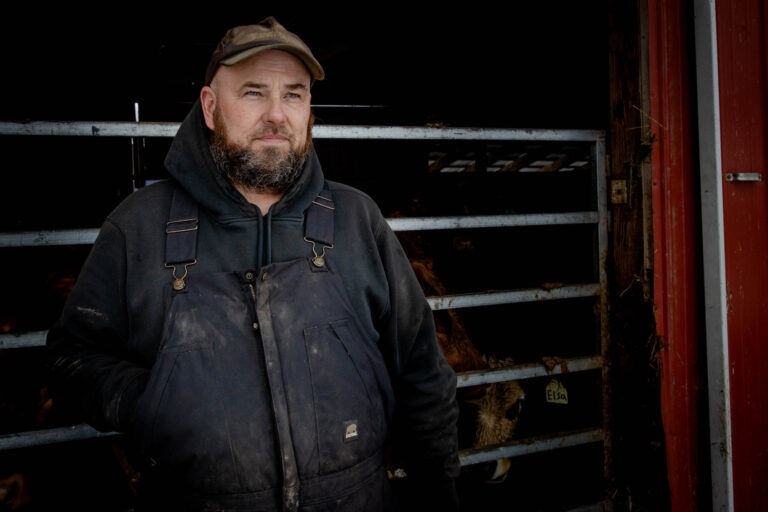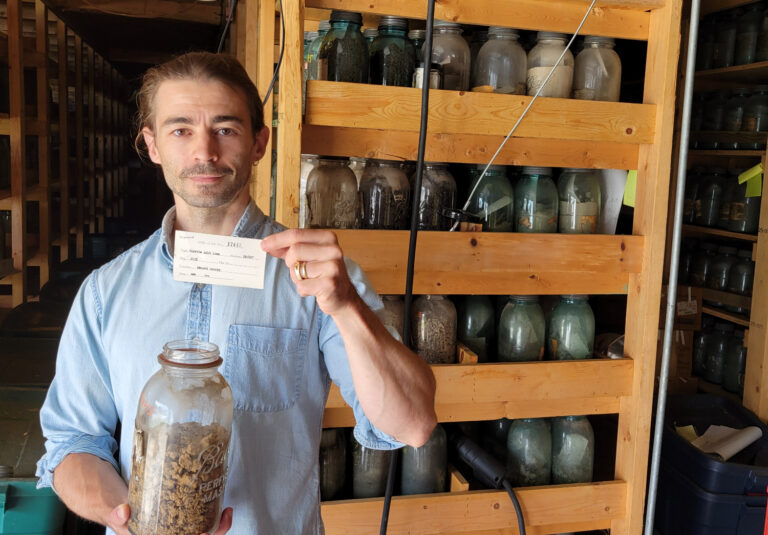Biosolids — a type of treated sewage byproduct from wastewater treatment plants — are used as a nutrient-rich fertilizer on farms across the Midwest. But a group of toxic “forever chemicals” are slipping through the cracks and could be inadvertently contaminating millions of acres of farmland.
Jason Grostic comes from a long line of farmers.
“This is a hundred-year-old operation,” Grostic said. “My grandpa milked cows, my dad milked cows, I milked cows, (then) got into the beef industry. It’s in my blood.”
But Grostic may be at the end of the line.
Two years ago, he was blindsided when the state of Michigan ordered him to shut down his farm, citing high levels of PFAS — or what are often referred to as toxic “forever chemicals” — in both his beef and soil.
Grostic had been using biosolids, a treated byproduct from wastewater plants, to fertilize his crops, which he then fed his cattle. But what he thought was a cost-effective fertilizer, turned out to be laden with PFAS.
It’s a risk, Grostic said, no one warned him about — and now his 400-acre farm has been deemed unusable.
“I took a fertilizer source that was recommended and was EPA-approved, and the government dropped the ball by not testing it and assuring it was a clean product,” he said.
Biosolids, also known as sludge or residuals, are used as fertilizer in nearly every state and screened for pathogens and heavy metals like lead, arsenic and mercury. But most states don’t currently test biosolids for PFAS, and state officials across the Midwest say they’re in uncharted territory without the proper tools.
Michigan is on the vanguard and has conducted one of the most extensive PFAS investigations in the country, testing municipal water systems, watersheds and sites with suspected contamination.
That has led the state to wastewater plants, biosolids — and eventually Grostic’s farm.

Grostic continues to feed and care for nearly 150 cows that were “seized” by the state, yet remain on his land and can’t be sold. Even after taking odd jobs and putting most of his equipment up for sale, Grostic said he’s on the brink of bankruptcy.
“As a farmer that can’t farm nothing, what am I supposed to do?” Grostic said.
He’s now in the midst of a lawsuit against an auto parts supplier, which released PFAS into the wastewater system and contaminated the biosolids he used on his farm.
Biosolids testing
PFAS are a group of more than 15,000 chemicals that are associated with various cancers, decreased immune response, liver disease and reproductive or developmental issues, among other adverse health outcomes.
But these toxic chemicals don’t break down, and most wastewater plants can’t treat them.
Harvest Public Media reached out to 13 Midwestern states for their policies on PFAS testing at wastewater treatment plants. While four, including Michigan, have a PFAS biosolids strategy, nine states said they are not regularly testing.
“We are wanting to get to as low of concentrations of PFAS in our effluent and biosolids as we can,” said emerging pollutant managers, Stephanie Kammer, with the Michigan Department of Environment, Great Lakes and Energy.
In addition to routinely testing, Michigan goes a step further and sets standards for what levels are acceptable in biosolids.
Kammer said if wastewater plants detect two compounds, PFOA and PFOS, above 100 parts per billion (ppb) in biosolids, they are considered “industrially impacted” and can no longer be applied to land. If they're under 20 pbb, they’re in the clear.
The program also focuses on identifying and minimizing industrial sources that flush PFAS down the drain and send them to wastewater treatment plants in the first place.
“That’s been really effective at reducing concentrations,” Kammer said. “There’s over 60 industrial facilities that have put in a (PFAS treatment system), prior to discharging to the municipal water systems.”
Kammer said the state’s been ahead of the curve in addressing PFAS, but she acknowledges the PFAS biosolids standards are not “risk-based.”
Regulatory uncertainties
There’s still a limited body of research on how PFAS are transferred from biosolids and soil into crops, agricultural products and the food system.
Currently, there are no federal food safety standards for PFAS. The Environmental Protection Agency is expected to release its highly anticipated risk assessment on PFAS in biosolids later this year and did not respond to Harvest's request for comment.
According to the EPA’s PFAS Strategic Roadmap, the assessment will “serve as the basis for determining whether regulation of PFOA and PFOS in biosolids is appropriate.”

Meanwhile, many states and regulators are waiting for the EPA’s guidance.
“To establish any regulation, I think, is a bit premature,” said Emy Liu, an environmental engineer in the Iowa Department of Natural Resources.
She said Iowa doesn’t have the funding to test wastewater or biosolids and doesn’t plan to until there’s more federal guidance.
“I think the right approach is to wait for the science to be cleared of what is the toxicity of PFAS,” Liu said. “Then (we can focus on) regulations to establish the limits.”
A ban on biosolids
But testing for PFAS in biosolids didn’t go far enough for officials in Maine.
In 2022, the Maine legislature banned the use of biosolids altogether, after the state identified dozens of contaminated farms.
“There were farms out of business and farmers very concerned about their health impacts,” said Shelley Megquier with the Maine Farmland Trust. “It seemed like a pretty common sense approach for a lot of us to ban the application of sludge.”
Megquier said she wouldn’t prescribe a ban to other states, but she doesn’t think using biosolids is worth the risk of contaminating farmland.
“We're still putting PFAS into lots of products that are making their way into our wastewater and being concentrated in biosolids,” Megquier said. “I can't see a time in the near future where biosolids do not contain PFAS.”

Reducing PFAS is a goal for the wastewater sector in states like Michigan with its industrial treatment program and Minnesota, where the state aims to “end avoidable PFAS use” by 2032.
But banning biosolids is not a popular policy solution among most states. In addition to serving as a fertilizer, biosolids are a cost-effective way to recycle waste.
Fred Hegeman, a residuals coordinator with the Wisconsin Department of Natural Resources, said a ban would be a “knee-jerk reaction.” He said the alternatives to using biosolids, would be sending them to a landfill or an incinerator.
“We don’t have the best available information to make really good decisions right now,” Hegeman said.
But if farmers don’t want to use biosolids, Hegeman said, that’s their right.
“That’s the beauty of living in the United States, because you get to pick and choose what you want to put on your land,” Hegeman said. “If a person wants to be cautious and (wait), that makes a lot of sense, but the jury’s out.”
Farmer safety nets
While Maine manages its biosolids ban and investigates farms for contamination, the state also created a $60 million fund to help impacted farmers.
Megquier said a similar national fund could encourage states to act while protecting farmers.
“With PFAS, if you look for it, you will find it,” Megquier said. “I think other states would be better supported in addressing PFAS with a federal safety net.”
Members of Maine’s congressional delegation recently introduced two federal bills to establish a grant program that would compensate farmers such as Jason Grostic.

Grostic remains the only farmer to have been shut down due to PFAS contamination in Michigan. The state argues it was an isolated case, and that because Grostic fed his cattle contaminated feed and sold directly to consumers, PFAS levels in his beef were more concentrated.
Grostic said he feels like the decision was made without any science backing it up, but he said a financial safety net would have been a “game changer,” as he struggles to pay his bills.
“I didn’t do this to myself,” Grostic said. “I never would have taken a product that I thought would completely destroy everything.”
Eventually, the remaining cattle on Grostic’s farm will be gone.
He points to the animals’ ear tags, which feature names like Gizmo, Elsa and Holy Smokes. Grostic said naming the cows had always been a family tradition, but he’s had to break the news to his kids: they won’t get to take over the farm.
“It’s not a conversation you want — it’s not one I should have to have,” Grostic said.
He doubts he’s the only farm with PFAS contamination in Michigan or the Midwest, and he hopes that as more testing is done, other farmers won’t be left behind.
This story was produced in partnership with Harvest Public Media, a collaboration of public media newsrooms in the Midwest. It reports on food systems, agriculture and rural issues.
9(MDM5MjE5NTg1MDE1Mjk1MTM5NjlkMzI1ZQ000))







